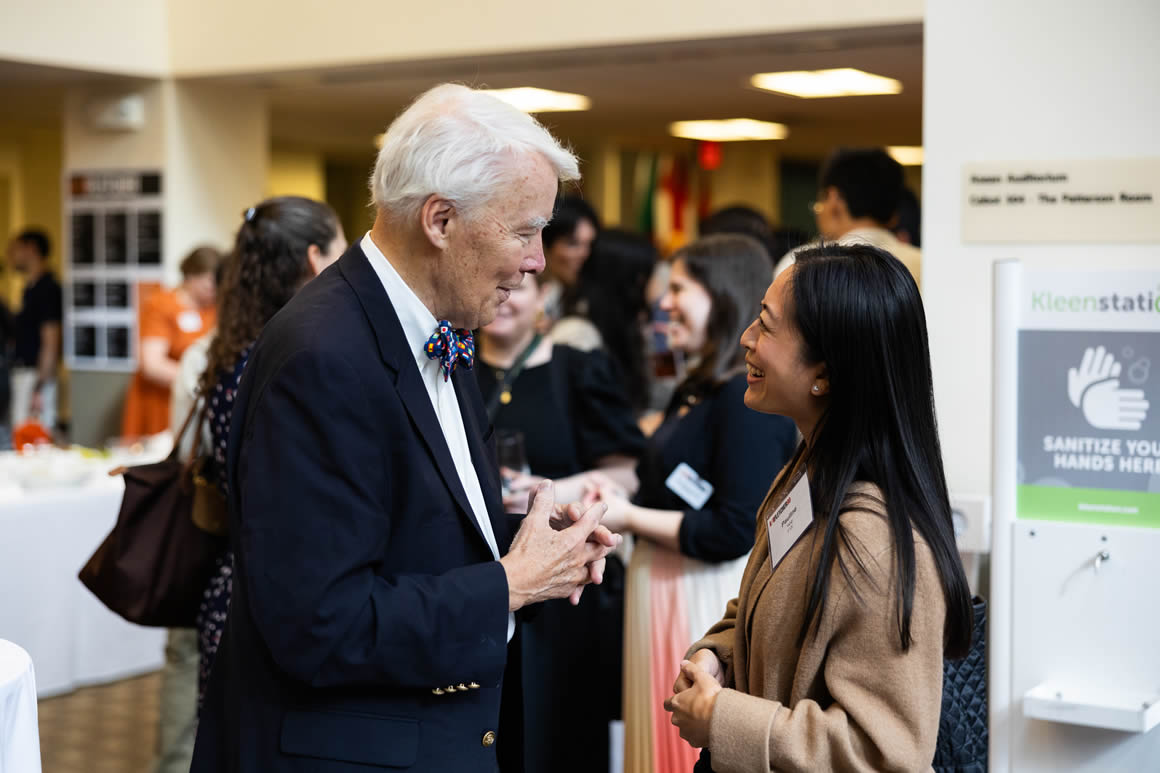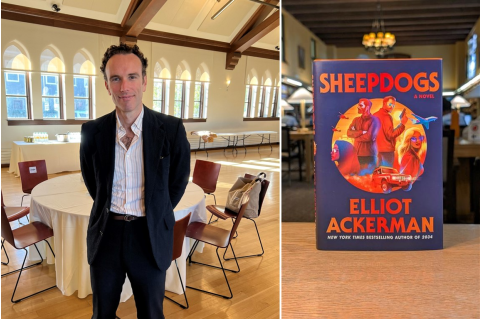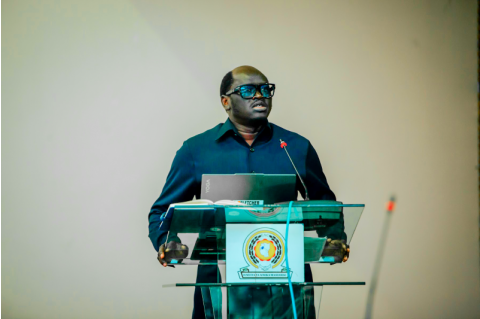-

Hear from Professor Monica Toft
Learn how Professor Monica Toft is shaping the study of global affairs and diplomacy at Fletcher.
Hear from Prof. Toft -

Explore Fletcher academics in action
Fletcher Features offers insights, innovation, stories and expertise by scholars.
Get global insights -
Get application tips right from the source
Learn tips, tricks, and behind-the-scenes insights on applying to Fletcher from our admissions counselors.
Hear from Admissions -

Research that the world is talking about
Stay up to date on the latest research, innovation, and thought leadership from our newsroom.
Stay informed -
Meet Fletcherites and their stories
Get to know our vibrant community through news stories highlighting faculty, students, and alumni.
Meet Fletcherites -

Forge your future after Fletcher
Watch to see how Fletcher prepares global thinkers for success across industries.
See the impact -

Global insights and expertise, on demand.
Need a global affairs expert for a timely and insightful take? Fletcher faculty are available for media inquiries.
Get in Touch
Connect

Ask any Fletcher alum and they’ll talk about the enthusiastic network of friends of Fletcher. Whether you live down the road or half the world away, there are many ways you can stay connected to the community you love.
Reconnect with community

Connect with fellow alumni and support current students in their job search by joining Fletcher CORE. Alumni have free access for life to Fletcher CORE, our online, password-protected directory and career platform. Search for classmates and members of the community, post jobs, view job postings, use the Resource Library and subscription services, and schedule appointments with the Office of Professional Development. Job postings available at all career stages.
As part of the Fletcher family, you are our greatest resource to help current students succeed! Reach out to the Office of Professional Development about career talks, site visits, internships, and full-time positions.
Fletcher hosts events, both in Medford and around the world, for our community to reconnect. Stay updated and register for the annual Alumni Weekend, London Symposium, or Talloires Symposium.
To inform Fletcher of updates to your contact information, please email fletcheralum@tufts.edu.
View Fletcher Alumni Clubs in a larger map. Please contact us to be added to any club elists.
Don't see a Fletcher Club in your area? Contact us to find out more about becoming a Club Leader.
Alumni Club Contacts
-
CALIFORNIA
BAY AREA
Ben Ball, F02SOUTHERN CALIFORNIA
Mark Nguyen, F98
Julie Tra, F21COLORADO
Katherine Conway-Gaffney, A07, F13
Matthew McCaffree, F06DISTRICT OF COLUMBIA
Matthew Reitz, F21
Lucia Lombardo, F21GEORGIA
ATLANTA
Stephen Bergey, F06HAWAII
HONOLULU
Rex Fujichaku, F97ILLINOIS
CHICAGO
Gregg Baker, F85MARYLAND
BALTIMORE
Quentin SaLay, F24MASSACHUSETTS
BOSTON
Maria Alvarez-Tolcheff, F18
Gerry Wawrzynek, F23MINNESOTA
TWIN CITIES
Andrew Dahlen, F14NEW YORK
NEW YORK CITY & TRI-STATE AREA
Claudio Guler, F15PENNSYLVANIA
PHILADELPHIA
Jocelyn Braddock, F12PITTSBURGH
Tom Etzel, F11TEXAS
AUSTIN
Scott Stanford, F13
UTAH
SALT LAKE CITY
Emily Kunz, F15WASHINGTON
SEATTLE
Bronce Perez Matos, F21
Amy Wolf, F23 -
-
NAMIBIA
Tega Shivute, F06NEPAL
Ram Thapaliya, F02NETHERLANDS
THE HAGUE
Gaspar Rodriguez, F16NICARAGUA
MANAGUA
Ana Paula Martinez, F17NIGERIA
Florence Young, F16NORWAY
Kyrre Berland, F22
PAKISTAN
Zoe Richards, F12PERU
LIMA
Giacomo Canepa, F17
Robert Helbig, F16PHILIPPINES
Mia Corpus, F11POLAND
WARSAW
Joanna Lisiecka-Zurowska, F16ROMANIA
Sinziana Pardhan, F07RUSSIA
Gaukhar Nurgalieva, F14SAUDI ARABIA
Jamil Al Dandany, F87
SERBIA
Naman Shrivastava, F22SOUTH AFRICA
Jacques Roussellier, F01SOUTH KOREA
SEOUL
Sukhee Han, F94SPAIN
MADRID
Lisa Neuberger, F02
Paul Shapiro, F86SWITZERLAND
GENEVA
Guillermo Luis Abel de los Santos, F05ZURICH
Frederic Ganner, F13TAIWAN
Dr. Shou-Chung Ting, F81, F84THAILAND
BANGKOK
Poomsanti Wairith, F10TURKEY
Neslihan Tombul, F83UKRAINE
KIEV
Olena Tregub, F13UNITED ARAB EMIRATES
DUBAI
Nivine Afiouni, F15
Damir Valeev, F10
-
Fletcher Alumni of Color Association
Kelly Smith, F03
Fletcher GBA Alumni
Tim Chang, F21
Leeann Sadler, F21Fletcher Lawyers Network
Louise Julin, F17
Joseph Klingler, F14
fletcherlawyersnetwork@gmail.comFletcher Ph.D. Alumni
Seeking new leadership
Fletcher Pride Alumni Network (FPAN)
Seeking new leadershipFletcher Women's Network (FWN)
Fletcheralumnae@gmail.comFWN/Boston: Anne Coyle, F03
FWN/DC: Carlisle Levine, F99
FWN/Geneva: Viola Csordas, F09
FWN/Maine:
Kari Sides Suva, F11
Ally Hawkins, F17
Allison Hodgkins, F10
Club Resources
-
A Fletcher Club is a group of alumni and friends who gather in a common geographical area or around a shared interest to stay connected with each other and with The Fletcher School. A Club serves as a resource and point of contact for alumni, students, prospective students, parents and The Fletcher School.
Benefits of Starting a Club
- Advocate for and help The Fletcher School in reaching institutional goals and aspirations
- Maintain and grow your Fletcher network
- Stay connected with the School
- Utilize career and networking opportunities
- Help educate prospective students on the benefits of attending the Fletcher School
- Enjoy meaningful experiences with others who appreciated their time at Fletcher
Step 1. Contact the Office of Development and Alumni Engagement
The Office of Development and Alumni Engagement will help you assess the alumni population in your area and guide you through the process of establishing an alumni Club or becoming a contact for alumni in your region, or those traveling through. To start the process, simply email to the team at fletcheralum@tufts.edu.
The Alumni Engagement Team assists club volunteers in many capacities including, but not limited to:
- Serve as a resource for planning Club events and activities, which includes create registration pages, track RSVPs for events, collect dues or fees associated with events
- Promote Club events via email and the web, including posting to social media sites and university-wide calendars
- Provides communication tools such as individual email list serves, as well as access to a club website, hosted through the Online Community, and contact lists of alumni located within the Club area
- Provides Fletcher-branded gifts for event hosts and visiting speakers (when applicable)
- Maintains, based on request, alumni Club websites found within the Online Community
- Assists with volunteer transitions, introductions, and when necessary, organizes nominations and elections for a new Club board
Should your club wish to manage event registrations on your own, we would recommend using Eventbrite, which is a useful tool for collecting event registrations. This service offers no charge for free events. Nominal fees apply for events with registration costs. If you would like to manage your event registrations, but are still interested in an invitation from our office that includes the official Fletcher header, please be in touch! We can arrange this for you, send you the template, and you may distribute to your contact list.
Step 2: Gauge Interest
Recruiting new volunteers for the Club is essential to vitality and growth. To gauge interest, we suggest the following:
- Invite local alumni to a dinner or happy hour to explain what being involved with the Club will entail
- Along with other interested alumni, work with ODAE to identify those who are interested in leadership roles and those who are interested in a supporting role.
- Surveys are a great way of capturing information from a large metropolis. Our Team is happy to work with you in creating and managing surveys on behalf of your club. This can serve as a way to find out when the alumni in your area are available, and what types of events they would be interested in attending. You may also include a question to provide employer details and industry to serve as a networking opportunity.
Step 3: Plan an Organizing Meeting
The first meeting should seek to address the following:
- Establish goals for the Club
- Determine appropriate leadership positions and responsibilities
- Plan a realistic event calendar
- Determine a specific date, time, location and contact for the first event
Step 4: Hold Your First Event
The inaugural event for a Club can take any number of forms, but a casual and social gathering is generally recommended. It is important to allow alumni to meet and network with one another.
In accordance with ODAE policies, please observe the following:
- Work with ODAE staff to ensure all alumni in the area have been notified of the new club
- Promote the event to your Fletcher community through email and social media
We encourage the use of Fletcher CORE in reaching your fellow alumni.
Please email fletcheralum@tufts.edu with any additional questions.
-
Volunteer Responsibilities & Expectations:
A Fletcher club volunteer's primary responsibilities are to promote Fletcher within their respective city or country and to provide a forum whereby both local and visiting members of the Fletcher community may connect. Volunteers achieve this by organizing a wide range of events, whose scope is dictated in part by the number of alumni in the area and the number of volunteers. Larger clubs may hold as many as 15 events each year, while the smallest clubs act as points of contact for individual visiting members of the greater Fletcher community. Nearly all programming is volunteer-driven, and in larger cities, may be organized by up to ten club volunteers working together.
All club volunteers sign a copy of the Tufts Confidentiality & Responsible Use Policy for Advancement Volunteers form before receiving contact information for fellow alumni to be used for club purposes.
Term of Service:
While club volunteers are typically not elected to set terms, many serve in their role for two to four years. After two years, the volunteer may reassess whether they'd like to continue in their role. The Office of Development and Alumni Engagement can assist in facilitating transitions via election or recruitment. If a club has pre-existing by-laws, terms of service and rules governing elections may be explicitly laid out.
Program Description:
The Fletcher School has 80+ clubs worldwide, each of which have between one and ten volunteers running them. Each club operates at a different level of activity.
In some cases, the volunteer mainly serves as a liaison for other Fletcher alumni passing through who hope to connect with alumni in the area. In other instances, clubs listed have robust social and intellectual programming driven by volunteer leaders and supported by the Fletcher Office of Alumni Engagement. New groups continue to be established on an ad-hoc basis.
Newer clubs and smaller groups are encouraged to start with one social and one intellectual event per year, to be built upon as the organization's structure solidifies.
How the Office of Development and Alumni Engagement Supports Clubs:
The Alumni Engagement Team assists club volunteers in many capacities including, but not limited to:
- Serve as a resource for planning Club events and activities, which includes create registration pages, track RSVPs for events, collect dues or fees associated with events. Promote Club events via email and the web, including posting to social media sites and university-wide calendars
- Provides communication tools such as individual email list serves and contact lists of alumni located within the Club area
- Provides Fletcher-branded gifts for event hosts and visiting speakers (when applicable)
- Assists with volunteer transitions, introductions, and when necessary, organizes nominations and elections for a new Club board
Club Leadership Duties and Responsibilities:
- Each Club has a Leader and oftentimes, one other member in an executive role
- Each Club will strive to obtain accurate contact information from alumni through event participation and outreach
- Clubs will provide documentation of events to ODAE through photos and attendance lists
- The Leader and members of the club committee will actively identify and recruit future Club volunteers for succession planning purposes
Business Entity FAQ
What is an Employer Identification Number (EIN)?
An Employer Identification Number (EIN) is also known as a Federal Tax Identification Number, and is used to identify a business entity.
Why does our club need an EIN?
A Club must obtain an EIN to open a bank account and to apply for federal tax-exempt status. Note: If a Club has a bank account but not an EIN, the bank account may have been opened with the Treasurer's Social Security number. This should be changed as soon as possible as it may affect the Treasurer's personal tax status.
An Employer Identification Number (EIN), also known as a Federal Tax Identification Number, is a permanent 9-digit number (like a Social Security number) used to identify a business entity. It is needed to apply for a bank account as well as for federal tax-exempt status.
Apply Online
The Internet EIN application is the preferred method for customers to apply for and obtain an EIN. Once the application is completed, the information is validated during the online session, and an EIN is issued immediately. The online application process is available for all entities whose principal business, office or agency, or legal residence (in the case of an individual), is located in the United States or U.S. Territories. The principal officer, general partner, grantor, owner, trustor etc. must have a valid Taxpayer Identification Number (Social Security Number, Employer Identification Number, or Individual Taxpayer Identification Number) in order to use the online application.
Apply By EIN Toll-Free Telephone Service
Taxpayers can obtain an EIN immediately by calling the Business & Specialty Tax Line at 800-829-4933. The hours of operation are 7:00 a.m. - 7:00 p.m. local time, Monday through Friday. An assistor takes the information, assigns the EIN, and provides the number to an authorized individual over the telephone. Note: International applicants must call 267-941-1099 (Not a toll-free number)
Apply By FAX
Taxpayers can FAX the completed Form SS-4 (PDF) application to their state FAX number (see Where to File - Business Forms and Filing Addresses), after ensuring that the Form SS-4 contains all of the required information. If it is determined that the entity needs a new EIN, one will be assigned using the appropriate procedures for the entity type. If the taxpayer's fax number is provided, a fax will be sent back with the EIN within four (4) business days.
Apply By Mail
The processing timeframe for an EIN application received by mail is four weeks. Ensure that the Form SS-4 (PDF) contains all of the required information. If it is determined that the entity needs a new EIN, one will be assigned using the appropriate procedures for the entity type and mailed to the taxpayer. Find out where to mail Form SS-4 on the "Where to File Your Taxes" (for Form SS-4) page.
What does it mean to be a non-profit? What is the benefit for our club?
In the U.S., non-profit organizations are formed by incorporating in the state in which they do business. U.S. Clubs with non-profit status are eligible for sales, property, and income tax exemptions in the state in which they are incorporated. Fletcher Clubs, based in the U.S., are encouraged to become legal entities by incorporating in their home state.
Are non-profit status and tax-exempt status the same?
Nonprofit status is a state law concept. Nonprofit status may make an organization eligible for certain benefits, such as state sales, property and income tax exemptions. Although most federal tax-exempt organizations are nonprofit organizations, organizing as a nonprofit organization at the state level does not automatically grant the organization exemption from federal income tax. To qualify as exempt from federal income tax, an organization must meet requirements set forth in the Internal Revenue Code. See Types of Tax-Exempt Organizations or Publication 557 for more information. A benefit of securing federal 501(c)(3) tax-exempt status is that your club has the ability to solicit tax-deductible gifts from members.
Non-profit organizations are formed in the U.S. by incorporating in the state in which they do business. You incorporate a non-profit by filing articles of incorporation (or other charter documents) with the appropriate local state office. Organizations with non-profit status are eligible for sales, property, and income tax exemptions in the state in which they are incorporated. If you want your non-profit to be exempt from federal taxes, you should file with the IRS to be a tax-exempt organization. The most well-known type of non-profit is a the IRS classification of 501(c)(3), a "charitable non-profit."
Non-profit organizations need not be tax-exempt organizations. The pursuit of tax exemption is a voluntary choice and non-profit organizations are free to be taxable if they so choose. However, most non-profit organizations not only incorporate as non-profit organizations (in their state), but also apply for recognition by the IRS as a tax-exempt organization. This tax-exempt status is granted by the federal government through the IRS, and is available only to entities already holding non-profit status.
Non-Profit Incorporation
Non-profit organizations are formed by incorporating in the state in which they do business. You incorporate a non-profit so that it exists as a separate legal organization in order to a) own its own bank account; b) be eligible for sales, property, and income tax exemptions; c) ensure that the non-profit can continue on its own; and d) protect yourself personally from liability from operations of the non-profit.
U.S. Fletcher Clubs interested in pursuing non-profit status in their home state should file with their Secretary of State, Corporation Division by completing the local state form, paying the relevant initiation fee (usually between $30 and $50), and submitting their Articles of Incorporation to outline the Club's nature and purpose.
Does my club need to file an Annual Return with the IRS?
If your Club has 501(c)(3) or 501(c)(7) tax-exempt status, you are required to file an Annual Return.
-
Alumni Club Events and Programs
There are many different types of alumni events that volunteers can help organize. Often, the type of event will vary depending on factors such as general group interest or the number of expected attendees. Below are a few examples of events that have had success in the past:
- Social Hours for alumni, students, parents and friends of Fletcher
- Speaker events featuring alumni, professors or other relevant members of the community
- Prospective student receptions
- Professional networking events
- Volunteer and community service events
- Holiday parties
- Book Clubs/Discussion Groups
- Community Dinners/Potlucks
- Run/Walk Groups
- Museum Tours
…and more!
Below please find the new Fletcher brand logo for use in connection with official Fletcher Club activities, along with examples of how the logo is to be used on event invitations and email announcements.
Please contact Fletchersupport@tufts.edu for assistance with the use of the new logo, or if you have any additional needs. We appreciate your help to replace any applications of the prior mark with this current one and are available to provide graphic design and other assistance as needed.
Logo
Coming soon
Email Announcement Example
Email Invitation Example










